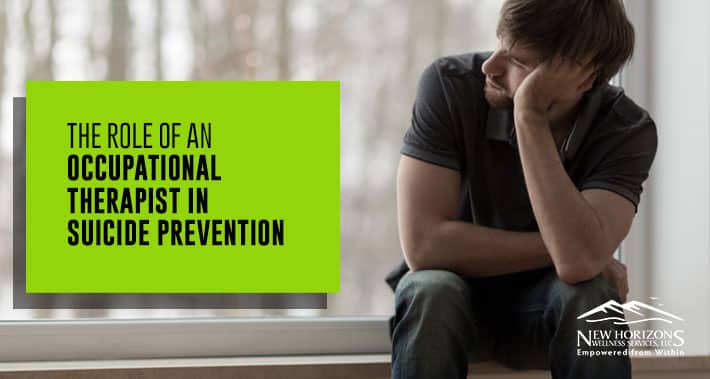
Content Warning: This article will discuss suicide and suicidal feelings. If you are experiencing suicidal thoughts and feelings please seek help. The toll-free National Suicide Prevention Lifeline is available 24 hours per day, 7 days a week at 1-800-273-TALK (8255).
One side effect of long term injury or illness which isn’t often spoken of, are suicidal thoughts, feelings, and sometimes, actions.
When an individual loses the ability to perform even the simplest of everyday tasks, they may start to feel as though they’re losing their independence, and for some, this can lead to suicidal ideations.
This loss of ability to perform tasks is called occupational deprivation, meaning a person feels they are no longer able to participate in meaningful activities.
They often feel as though some things are beyond their control, as a result of their injury or illness.
In many of these cases, occupational therapy treatment for adults can help to address these feelings and mitigate the risk of suicide.
Keep reading to learn more about the role of occupational therapists in suicide prevention.
What Is Suicide Prevention?
In 2018, suicide was the tenth leading cause of death in the United States, the second leading cause among those aged 10 to 34, and the fourth leading cause in people aged 35 to 54.
From these numbers, it’s clear this is a significant health concern, which may or may not have outward warning signs.
Suicide prevention starts with the recognition of these warning signs, which include:
● Expressing feelings of wanting to die
● Feelings of hopelessness
● Feelings of not wanting to live
● Taking steps to make a will, giving away valuable items
● Saying goodbye to family and friends
● Starting to make a plan, researching suicide methods online or obtaining a gun, pills, etc.
● Extreme mood swings
● Talking about death
● Expressing feelings of shame or guilt
● A feeling of being trapped
● Risk-taking behavior, such as stunt driving
● Expressing feelings of range, or revenge
● Increased use of alcohol or drugs
● Increased anxiety and agitation
● Changes in sleeping and/or eating habits
● Withdrawing from friends and family
If someone you know is exhibiting these signs, there are five action steps which you can take to help, which are:
1. Ask if they are considering killing themselves.
2. Keep them safe, by removing items which could be used to kill themselves from their environment such as guns or pills
3. Be there for them, and let them talk – acknowledging and discussing their feelings may reduce their risk.
4. Help them connect to resources with as the National Suicide Prevention Line
5. Stay connected with them – follow up and show you are there for them.

What Does Suicide Look Like In The Disabled Community?
A 2012 study in the journal Alter found that individuals living with a disability are four times more likely to attempt suicide than those without one.
There has long been a correlation between disability and depression, which is one possible reason for the higher likelihood of attempted suicide in disabled communities.
Factors which may contribute to this may include:
● Societal factors
● Psychiatric factors
● Lifestyle factors
● Difficulty in carrying out day-to-day activities
● Viewing oneself as a burden to others
Each of these factors can combine to create a complex web which influences how persons with disabilities view themselves and their situation.
The study cited above found one of the factors which contributed to a higher likelihood of someone having made a suicide attempt was being in poor physical health.
Another factor was those with three or more limitations with activities of daily living (ADL) or instrumental activities of daily living (IADL), which include:
● Personal care (dressing, washing)
● Medical care, taking medications
● Getting around or using transit
● Household activities such as housework or food preparation
● Practical activities (household tasks)
● Money management/budgeting
● Completing paperwork
How Can An Occupational Therapist Help With Suicide Prevention?
If you’re feeling hopeless because you’re unable to complete daily life tasks such as the ones listed above, this is occupational deprivation.
As these feelings intensify, you may begin to feel they have no other option but to end your life, but there is help.
An occupational therapist can help give you the tools and skills you need to start re-introducing these activities to your life.
This process can take time, however.
But as you regain your ability to perform the activities you’re struggling with, it can help to counter suicidal thoughts.
If you’re considering suicide because of the above concerns, ask yourself the following question:
Do you really want to die, or do you just not want to live with your limitations?
If the answer is the latter, an occupational therapist can help you.
Some of the ways occupational therapists can help promote mental well-being and suicide prevention include:
● Helping you determine which activities play a role in giving your life meaning
● Creating goals to enable your ability to partake in those activities
● Identify risk factors for suicide and work to manage those factors
● Assist clients with networking in order to receive community support
● Helping you develop cognitive strategies to combat suicidal thoughts
● Creating structure in your life so you can balance what you need, want and are expected to do
Of course, it also helps to connect with a qualified counselor who can help you work through these concerns.
It’s not uncommon for occupational therapists, speech language pathologists, and counselors/therapists to work side by side in such a scenario in order to get the most out of your rehabilitation.
Hopelessness is a terrible thing to live with, but you can get better.
Book An Appointment With New Horizons Wellness Services
Are you frustrated at not being able to complete day-to-day tasks due to injury or disability?
Have these frustrations made it difficult to enjoy life?
Do you feel as though you are a burden on others around you, who you require support from for even the simplest of tasks?
New Horizons Wellness Services can help.
We have licensed occupational therapists who can work with you to develop a plan to help you regain your independence.
Contact New Horizons Wellness Services today.
Yours in Health,
New Horizons Wellness Services13333 SW 68th Pkwy,
Tigard, OR 97223
- https://g.page/newhws
New Horizons Wellness Services provides a true multidisciplinary approach to mental & physical health treatments for children, adults and families.
